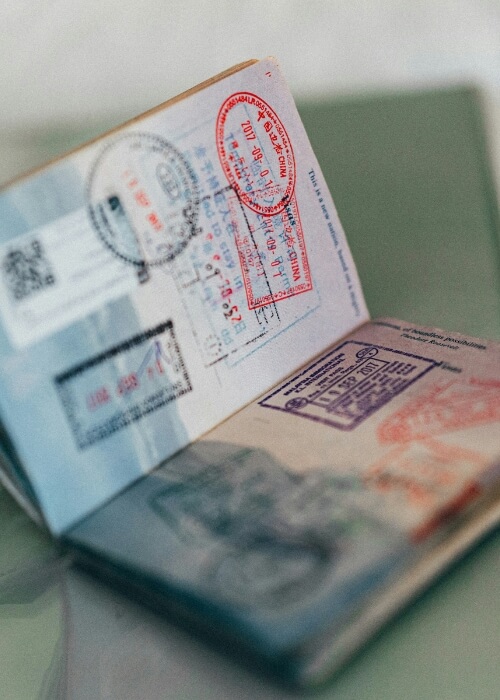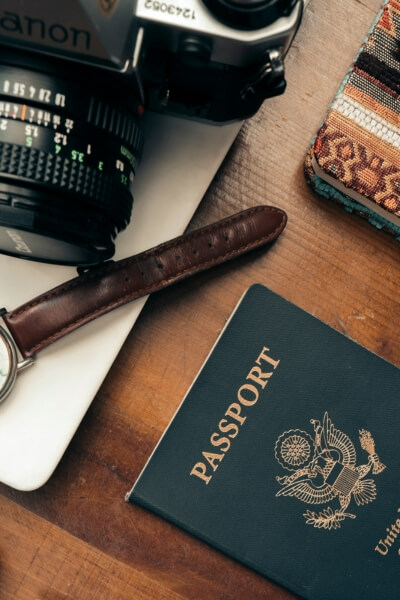Call us now:

Work permit in Thailand
Foreigners who want to be otherwise employed in Thailand must have the relevant work permit. However, for a work permit to be granted to a foreign national, the Department of Labour has to consider the qualifications of the foreign national and the requirements that the employer has to fulfill . The application for a work permit also needs to be made personally by the foreign national. Work permits are issued in Thailand by the Department of Employment of the Ministry of Labour and Welfare. We can help you to easily navigate through the process of applying for a work permit Thailand, which may be otherwise quite complex.
Table of Contents
Work Permit Visa
It is required to possess a comprehensive view to navigate work permit visa system in Thailand. Indeed, to work in a foreign country, one must have a work permit. However, before getting this permit, one needs to first obtain the proper visa, which will be such as Non-Immigrant B visa . It is designated for those wishing to pursue business or professional activity in Thailand. It is obligatory to remember that overstaying a visa may result in adverse effects, ranging from a fine to a re-entry ban.


SMART Visa
The innovative SMART Visa program of Thailand, launched on 1 February 2018, provides a new route for foreign individuals with talent to share it and establish their enterprises in the nation. The programme is built around a renewable four-year visa, which caters to a broad range of clients. These include fledgling start-up entrepreneurs venturing into their first company, as well as experts, highly skilled specialists, senior executives, and investors. They are vital in broadening Thailand’s career and know-how in several sectors: the next decade of automotive progress, cutting-edge smart electronics, the audacious universe of medical and wellness tourism, agriculture and biotechnology that support our livings are ever more sustainable, the dynamic spheres of automation and robotics.
The Long-Term Resident Visa
The Long-Term Resident (LTR) Visa is more than a document; it’s an invitation to embark on a transformative journey of residency, professional engagement, and cultural immersion in Thailand. As you contemplate the prospect of making Thailand your long-term home, we encourage you to explore the many opportunities and experiences of the LTR Visa. To gain a deeper understanding of this unique visa category and its application process, our dedicated team is poised to guide you every step of the way.

BOI Visa in Thailand
Whether you have the business idea in your mind that you wish to implement? If you think that Thailand is everything that’s made just for you to get your company registered, there are a few more things to think of. One of them is the BOI Visa that allows foreign investors to deal with business operations seamlessly. You may reach out to our legal professionals that will guide you through the whole registration procedure along with the BOI Visa obtaining.
More informations about Work Permit Thailand
According to the Foreign Workers Act (2008), not only employers but also a foreigner who intends to engage in labour activity in the state must have a work permit. This is an official document issued by the Department of Labour. It is a blue booklet and includes information about an employer and an employee. The latter is provided with such a permit, valid for a year and must be renewed.
Not all jobs are open to foreigners due to restrictions imposed by Thai law. These are mainly manual jobs, trades, hairdressing, and sales. Expressly, foreigners are prohibited from the following types of work :
- Intense physical labor, except as mentioned below, in the fisheries sector.
- Agriculture, animal husbandry, forestry, and fishing, except for work requiring special knowledge, farm supervision, and primary operations in the fishing sector, including deep-sea fishing.
- Bricklaying, carpentry, and similar work.
- Transport and logistics, excluding international air transport.
- Mail order sales.
- Sale by auction.
- Accounting and auditing, except for occasional internal audits.
- Goldsmithing, silver-plating, or other work on precious metals.
- Production of bronze objects.
- Miscellaneous occupations in the clothing industry.
- Brokerage and agency activities, except for international transactions.
- Engineering, including design and calculation, research, inspection, supervision, and consultancy, except in fields requiring specialized knowledge.
- Architecture, in the sense of designing, painting, supervising or advising.
- Travel agencies or tourist guides.
- Commerce (in part)
- Secretarial activities.
However, foreigners with special permits may engage in local occupations usually reserved for Thai citizens.
- Trade in goods other than medicines, chemicals, radios, televisions, cameras, explosives, or firearms.
- Repairing vehicles or car bodies.
- Selling food and beverages.
These lists should be distinct from those in the Foreign Enterprise Act, although the lists may be identical in some respects. All these restrictions are designed to protect Thai workers and businesses from foreign competition.
In general, foreigners must have a work permit to work in Thailand, which should be completed before they are allowed to work.
However, the specific Decree of March 2018 has relaxed several requirements. After the Royal Decree “Decree No. 2”, a publication had to be issued in order to relax these regulations. However, in certain circumstances, exemptions may give foreigners this right. Some foreigners will have a broad exemption and will not have to apply for a work permit at all. For this to be allowed, such a contractor should be a citizen of a specific country. Of course, the stay of the foreigner on Thai territory must be a temporary migration and be arranged according to the conditions of the Immigration Act. This work should also be “urgent and crucial”.
Therefore, these individuals will legally enter Thailand solely on a tourist visa or with a regular “30-day visa exemption stamp”. According to Article 9 of the Foreign Workers Act : shall engage in all work as set out under Section 7 unless a temporary migrant worker. He or she shall have the right to a crucial and time-bound job, which takes no more than 15 days, and job can take place after he or she informs the registrar orally. This will include a specific form from a contractor with a way out by his employer. This paper will be submitted to the Department of Labour to do the study. This request can be made in one day.
Nevertheless, ‘urgent and crucial jobs’ listed under this law are very specific and narrowly defined, and the order is given to the authorities :
– Diplomatic or consular officials.
– Representatives of member states and officials of the United Nations and its specialized agencies.
– Personal employees of the above.
– Persons performing a function or mission under an agreement between the Thai government and foreign governments or national organizations.
– Persons performing a function or mission in education, promotion of culture, arts, sports, or any other activity specified by Royal Decree.
– Persons authorized by the Thai government to come and perform a specific function or mission.
– Persons carrying out specific socio-cultural activities or missions, such as assisting the Thai government in promoting educational, cultural, and artistic cooperation and participating in related meetings, workshops, and exhibitions, for a maximum stay of 30 days.
Non-professional activities
According to a statement issued by the Ministry of Employment on 6 March 2015, the activities listed below are not considered “employment” and therefore do not require a work permit:
– Attending a conference, debate, or seminar.
– Attending an exhibition or trade fair.
– Attending a business trip or professional conference.
– Being invited to a private or academic conference.
– Attending a professional course or workshop.
– Buying products at a showroom.
– Attending a board meeting of your own company.
Anyone wishing to work in Thailand must obtain a work permit. To acquire a work permit, foreign nationals first need to secure either a B non-immigrant visa or residence permit. Additionally, an O non-immigrant visa holder married to a Thai citizen can apply for a work authorization.
Potential employers can initiate a work permit application before the applicant’s arrival in Thailand. However, the physical permit, taking the form of a blue booklet, will only be issued once in the country. Persons must collect it themselves. To pursue a work permit, one has to visit the Division of Foreign Employment under the Ministry of Labour. All documentation necessitates Thai translation if not already in the language.
A unique service caters to companies enjoying investment incentives from the Board of Investment of Thailand. The One-Stop Service Centre offers particular convenience for work permit applications and visa extensions. Certain enterprises qualify for the facility absent BOI backing as well. These include:
Regional or representative offices
Companies OK’d by the Industrial Estate Authority of Thailand or the Petroleum Institute of Thailand
Firms holding at minimum 30 million Thai baht in registered capital or current assets
For non-BOI supported companies, the Single Service Centre solely relates to work allowances for directors or consultants. Other businesses must follow regular procedures. Those not sponsored by the BOI still adhere to special eligibility standards for work permit applications as in normal processing. However, granting and renewing work permits and visa extensions allows more prompt completion and handling in one location.
The differences and similarities between non-BOI-sponsored and BOI-sponsored companies are detailed below:
- General requirements
Companies that are not eligible for BOI support must meet the following criteria:
- Registered capital of at least 2 million baht per foreign employee is required prior to the establishment of the legal entity.
- If the foreigner is married to a Thai citizen and has a marriage visa, the above capital requirements are halved.
- If the legal entity is a foreign company (more than 49% owned by foreign shareholders), a minimum capital of 3 million baht per foreigner must be brought into the country as a registered branch of a foreign company.
Under Thai law, a Thai company can register and then obtain a maximum work permit. However, there are exceptions to this restriction, as follows:
- The company employs at least 100 Thai nationals. In this case, it can apply for more than one work permit.
- business is export-related and has earned at least 30 million baht in foreign currency in the previous year. One additional work permit is available for each 30 million Thai baht.
- Tourism businesses can apply for one additional work permit for every 5,000 tourists.
- An additional work permit can also be obtained for every 3 million in corporate income tax paid by a Thai company.
In addition, all of the above limitations on capital or number of work permits do not apply if:
- The employee works for a foundation established under Thai law with assets exceeding 3 million Thai baht.
- The employee works in the entertainment industry on a temporary basis.
- Special skills and knowledge are required for the employee to complete a project within a specified timeframe.
- The employee’s tasks involve technology that cannot be used by Thai citizens, or the Thai labor market cannot provide such specialists. In this case, the technology transfer must benefit at least two Thai nationals for a specified period of time.
All these rules apply to all work permit applications and renewals.
Companies benefiting from the BOI enjoy significant advantages by not having to comply with restrictions on Thai capital and employees. Foreign employees can benefit from the BOI visa and work after approval by the BOI.
Any foreigner who works without a valid work permit or violates the conditions of employment specified in the work permit is liable to imprisonment for up to five years or a fine of 2,000 Thai baht to 100,000 Thai baht, or both. If the foreigner works in a prohibited field (reserved for Thai nationals), he or she is liable to a fine of up to 20,000 Thai baht. A foreigner who is caught will probably only have to pay a fine if it is the first time they have broken the law. But the court is free to make its decision. The foreigner will be expelled from the country and will usually be banned from returning for one year. If the employee does not have a work permit, the employer may have to pay a fine of 400,000 to 800,000 Thai baht. Otherwise, a fine of up to 400,000 Thai baht may be imposed. This depends on the offense committed.
The following specific requirements apply if the employer is a foreign legal entity incorporated in Thailand:
- For the following types of activities in Thailand for the parent company, representative offices can apply for up to two work permits.
- Updating the activity in Thailand for the head office.
- Providing information about new services or products to the head office.
- Advising on various product issues for the head office to distribute to agents or end users.
- For the following types of activities in Thailand for the head office, representative offices can apply for up to five work permits.
- Supplying products or services in the country for the head office.
- Inspecting products and controlling quantity/quality if purchased by the parent company or if the products are manufactured in Thailand on behalf of the parent company.
- There is an exception to this restriction if the products or services from Thai manufacturers or suppliers are worth at least 100 million Thai baht in the previous year.
- Similarly, the regional offices of a foreign structure can apply for a maximum of 5 work permits. An exception to this limit is if the local office has brought more than 10 million Thai baht into Thailand in the previous year.
